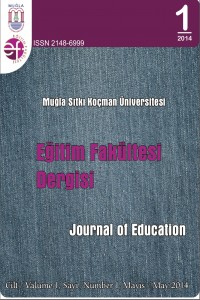Abstract
Qualified person is the one who can establish healthy communication with himself/herself and other people, who can observe the nature, who is aware of the events happening around him/her and who has the ability of conceptualization. Reading habit possesses a great importance in upbringing this qualified person. Reading habit enriches individuals’ vocabulary, fully develops emotions and thoughts. Development of emotions and thoughts contributes to a healthy communication among people. People with the habit of reading can look at the world from a broader perspective. The aim of this study is to examine prospective Turkish teachers’ reading habits and their usage of the library, to emphasize how important is the reading habit in upbringing qualified people in education. In line with this purpose, a ‘Reading Habit Questionnaire’ is submitted to a total of 192 people- 76 boys and 116 girls- who are students at Turkish Language Teaching Department, Education Faculty in Muğla Sıtkı Koçman University. Gathered data is analyzed in terms of frequencies and crosstabs using SPSS 20.00 (Statistical Package for Social Sciences). Results of this research show that reading habit and frequency of library usage of prospective Turkish teachers are not at an adequate level
References
- Akçataş, A. (2002). Dile Hâkimiyetin Geliştirilmesinde Verimli Okumanın Önemi. Türk Dili, Sayı: 604, s.308313.
- Balcı, A. (2009). İlköğretim 8. Sınıf Öğrencilerinin Okuma Alışkanlık ve İlgileri Üzerine Bir
- Araştırma. Yayımlanmamış Doktora Tezi. Gazi Üniversitesi Eğitim Bilimleri Enstitüsü, 2009, Ankara.
- Coşkun, M. Volkan. (2008). Türkçenin Ses Bilgisi. İstanbul: IQ Kültür Sanat Yayıncılık.
- Dökmen, Ü. (1994). Okuma Becerisi, İlgisi ve Alışkanlığı Üzerine Psiko-Sosyal Bir Araştırma.
- İstanbul: Millî Eğitim Basımevi. Özbay, M. (2006). Okuma Eğitiminde Çevre Faktörü. Eorusion Journal of Educational Research. Sayı: 24, s.161-170.
- Özbay, M. (2009). Anlama Teknikleri: I Okuma Eğitimi, Ankara: Öncü Kitap.
- Sağlam M., Suna Ç. ve Çengelli M. (2008). Öğretmen Adaylarının Okuma Alışkanlıklarını
- Etkileyen Etmenlere İlişkin Görüş ve Önerileri. Millî Eğitim Dergisi, Sayı: 178, s. 8-22. Sevmez, H. (2009). Türkçe Öğretmen Adaylarının Okuma Alışkanlığı ve Kütüphane
- Kullanımı Üzerine Bir İnceleme (SÜ Eğitim Fakültesi Örneği). Yayımlanmamış Yüksek Lisans Tezi. Selçuk Üniversitesi Sosyal Bilimler Enstitüsü, 2009, Konya MEB content/uploads/2013/12/pisa2012-ulusal-on-raporu.pdf adresinden, 03.02.2014 tarihinde alınmıştır. 2012 Ulusal Ön Raporu. (http://pisa.meb.gov.tr/wp- http://www.kygm.gov.tr/TR,9/istatistikler.html Perihan Gülce ÖZKAYA
- Muğla Sıtkı Koçman Üniversitesi E-mail: gozkaya@mu.edu.tr
TÜRKÇE ÖĞRETMENİ ADAYLARININ OKUMA ALIŞKANLIKLARI VE KÜTÜPHANE KULLANIMLARINA İLİŞKİN BİR İNCELEME (Muğla Sıtkı Koçman Üniversitesi Eğitim Fakültesi Örneği)
Abstract
Özet
Nitelikli insan, kendisiyle ve diğer insanlarla sağlıklı iletişim kurabilen, tabiatı gözlemleyen, çevresinde olup bitenlerin farkında olan ve kavramlaştırma becerisine sahip insandır. Nitelikli insan yetiştirmede, okuma alışkanlığı büyük önem arz etmektedir. Okuma alışkanlığı bireylerin kelime hazinesini zenginleştirir, duygu ve düşünceleri olgunlaştırır. Duygu ve düşüncelerin olgunlaşması, insanlar arasında sağlıklı iletişim kurulmasını sağlar. Okuma alışkanlığı gelişmiş insanlar, hayata geniş bir pencereden bakabilirler. Bu araştırmanın amacı; Türkçe öğretmeni adaylarının okuma alışkanlıklarını ve kütüphane kullanımlarını araştırmak, eğitimde nitelikli insan yetiştirmede okuma alışkanlığının ne derece önemli olduğunu vurgulamaktır. Bu amaç doğrultusunda, Muğla Sıtkı Koçman Üniversitesi Eğitim Fakültesi Türkçe Eğitimi Bölümünde okuyan 76 erkek ve 116 bayan olmak üzere 192 öğrenciye, “Okuma Alışkanlığı Anketi” uygulanmıştır. Elde edilen veriler, bilgisayar paket programı SPSS 20.00 (Statistical Package for Social Sciences) kullanılarak frekans sıklıkları ve çapraz tablolar bakımından analiz edilmiştir. Yapılan bu araştırma sonucunda, Türkçe öğretmeni adaylarının okuma alışkanlıklarının ve kütüphane kullanım sıklıklarının yeterli düzeyde olmadığı görülmüştür.
Anahtar Kelimeler: Okuma, Okuma Alışkanlığı, Dil Gelişimi, Kelime Hazinesi, Kütüphane kullanımı.
INVESTIGATING TURKISH LANGUAGE TEACHER CANDIDATES’ READING HABITS AND USE OF LIBRARY
Abstract
Qualified person is the one who can establish healthy communication with himself/herself and other people, who can observe the nature, who is aware of the events happening around him/her and who has the ability of conceptualization. Reading habit possesses a great importance in upbringing this qualified person. Reading habit enriches individuals’ vocabulary, fully develops emotions and thoughts. Development of emotions and thoughts contributes to a healthy communication among people. People with the habit of reading can look at the world from a broader perspective. The aim of this study is to examine prospective Turkish teachers’ reading habits and their usage of the library, to emphasize how important is the reading habit in upbringing qualified people in education. In line with this purpose, a ‘Reading Habit Questionnaire’ is submitted to a total of 192 people- 76 boys and 116 girls- who are students at Turkish Language Teaching Department, Education Faculty in Muğla Sıtkı Koçman University. Gathered data is analyzed in terms of frequencies and crosstabs using SPSS 20.00 (Statistical Package for Social Sciences). Results of this research show that reading habit and frequency of library usage of prospective Turkish teachers are not at an adequate level.
Key Words: Reading, Reading habit, Language improvement, Vocabulary, Library usage.
References
- Akçataş, A. (2002). Dile Hâkimiyetin Geliştirilmesinde Verimli Okumanın Önemi. Türk Dili, Sayı: 604, s.308313.
- Balcı, A. (2009). İlköğretim 8. Sınıf Öğrencilerinin Okuma Alışkanlık ve İlgileri Üzerine Bir
- Araştırma. Yayımlanmamış Doktora Tezi. Gazi Üniversitesi Eğitim Bilimleri Enstitüsü, 2009, Ankara.
- Coşkun, M. Volkan. (2008). Türkçenin Ses Bilgisi. İstanbul: IQ Kültür Sanat Yayıncılık.
- Dökmen, Ü. (1994). Okuma Becerisi, İlgisi ve Alışkanlığı Üzerine Psiko-Sosyal Bir Araştırma.
- İstanbul: Millî Eğitim Basımevi. Özbay, M. (2006). Okuma Eğitiminde Çevre Faktörü. Eorusion Journal of Educational Research. Sayı: 24, s.161-170.
- Özbay, M. (2009). Anlama Teknikleri: I Okuma Eğitimi, Ankara: Öncü Kitap.
- Sağlam M., Suna Ç. ve Çengelli M. (2008). Öğretmen Adaylarının Okuma Alışkanlıklarını
- Etkileyen Etmenlere İlişkin Görüş ve Önerileri. Millî Eğitim Dergisi, Sayı: 178, s. 8-22. Sevmez, H. (2009). Türkçe Öğretmen Adaylarının Okuma Alışkanlığı ve Kütüphane
- Kullanımı Üzerine Bir İnceleme (SÜ Eğitim Fakültesi Örneği). Yayımlanmamış Yüksek Lisans Tezi. Selçuk Üniversitesi Sosyal Bilimler Enstitüsü, 2009, Konya MEB content/uploads/2013/12/pisa2012-ulusal-on-raporu.pdf adresinden, 03.02.2014 tarihinde alınmıştır. 2012 Ulusal Ön Raporu. (http://pisa.meb.gov.tr/wp- http://www.kygm.gov.tr/TR,9/istatistikler.html Perihan Gülce ÖZKAYA
- Muğla Sıtkı Koçman Üniversitesi E-mail: gozkaya@mu.edu.tr
Details
| Primary Language | Turkish |
|---|---|
| Journal Section | Articles |
| Authors | |
| Publication Date | May 28, 2014 |
| Published in Issue | Year 2014 Volume: 1 Issue: 1 |


